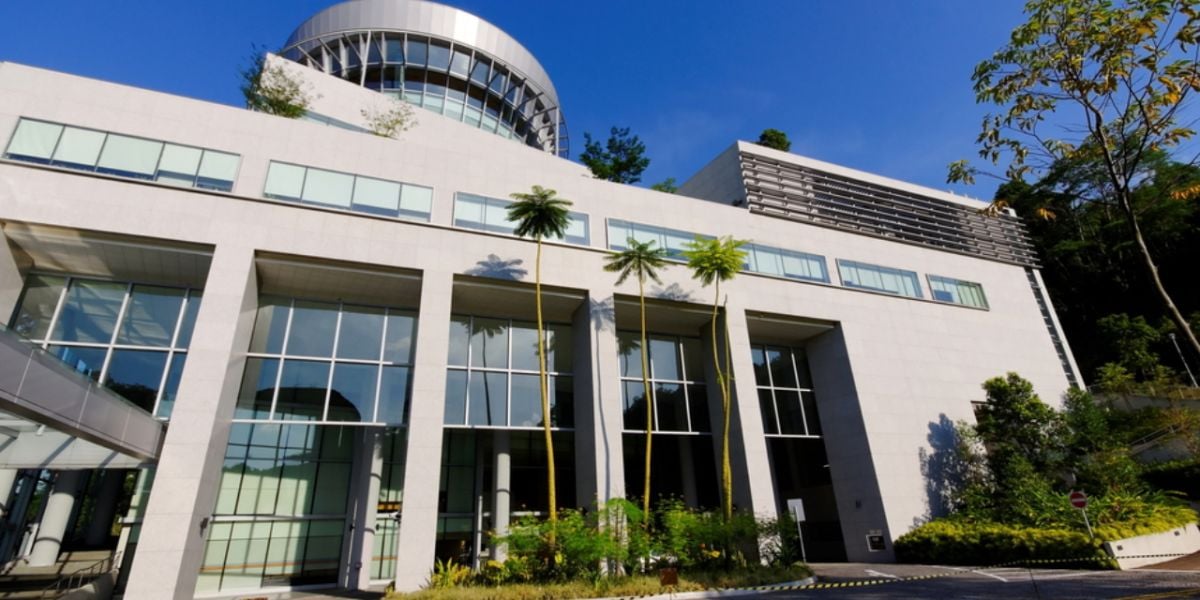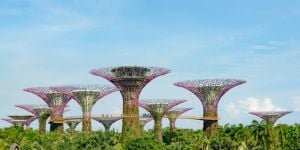
Singapore is home to four large ethnic groups: Chinese, Malay, Indian, and Eurasian, whose influences and multicultural heritages form a strong Singaporean identity, and this is surely reflected in its amazing food culture! As a world-leading financial center, it maintains strong connections with the West. While it's one of the world's most expensive cities (according to the latest Mercer Cost of Living Index), it also remains one of the most popular expat destinations worldwide.
Why study in Singapore?
Quality education and high employability
Singapore has one of the best education systems in the world, as government initiatives focus on the value and importance of educational innovation being part of the country's economy.
In fact, two Singapore universities ranked among the top 30 worldwide following the QS World University Ranking in 2024, and a series of global reports have recognized Singapore's world-leading research and innovation. A degree from Singapore will open many doors.
Despite being one of the most expensive cities in the world, it ranked high in the QS Best Student Cities in 2024 in 17th place, and as an international student, you can get a scholarship!
The gateway to Asia
Exploring other countries in Southeast Asia is easy, as Singapore's excellent geographical position makes it an ideal travel base. It's not uncommon to take a weekend trip to Malaysia or Thailand, and Indonesia, Cambodia, China, and India are no more than a 5- to 6-hour flight away.
The academic environment in Singapore
Singapore may be small, but in the realms of higher education and research, it's known as one of the best worldwide, as education has been a government priority and a key driver for its economic development.
Over the last two decades, higher education gained prominence, and Singapore is now home to world-leading universities. The 5.9 million City-state attracted around 65,000 international students in 2023. You'll feel part of the melting pot.
The teaching culture in Singapore
You'll attend reading lectures to cover theory at a pretty quick pace and more practical tutorials where you'll have the opportunity to ask questions and do exercises, presentations, group work, and individual work. Most locals print out materials before class, as lectures tend to be rather fast; it's not for slow writers!
You may find that students ask fewer questions during class than you may be used to back home. Nonetheless, grades are mostly dependent on the final exam, as well as in-class performance, group projects, or papers.
You'll address the teachers formally using “Mr.” or “Mrs.” and the last name.
The teaching language
The teaching language will be English, and you'll need to comply with the university's English language requirements as part of the application process. There are usually a number of ways to do this (check with the university of your choice):
- take a language proficiency test, for example, IELTS or TOEFL. Check in advance which certificates are eligible at the university of your choice. To get the best chance of acceptance, you'll need high scores;
- provide proof of previous qualifications to confirm your level of English or that you meet possible English language exemptions.
Singapore's leading universities
Singapore's two leading universities, the National University of Singapore (NUS) and Nanyang Technological University (NTU), rank among the top 15 worldwide, according to QS.
National University of Singapore (NUS) – #8 worldwide
Founded in 1905, NUS is an autonomous, research-intensive university and the oldest and largest institute of higher education in Singapore. Following the latest 2024 QS World University Rankings, it made it to eighth place in the world and consistently ranked first in Asia.
To date, there are 17 faculties and schools across three campuses, as well as four Research Centres of Excellence (RCE) and 29 university-level research institutes and centers, offering a global approach to education and research while focusing on Asian expertise and perspectives.
The university is home to almost 40,000 students from 100 countries, and it offers various student exchange programs and entrepreneurial internships at 12 NUS Overseas Colleges, as well as joint or double degree programs with top universities. In fact, many NUS undergraduates take part in study-abroad programs with over 300 universities in more than 40 countries.
The NUS is also very active in entrepreneurial education, focusing its activities on four areas: experiential education, business incubator, entrepreneurship development, and entrepreneurship research.
If interested, don't hesitate to browse the NUS website.
Nanyang Technological University (NTU) – #26 worldwide
NTU is a young, research-intensive, and comprehensive university with over 24,000 students attending its colleges and schools. Following the QS World University Rankings, it ranks right behind NUS at 26th place worldwide and fourth in Asia, with strong marks in engineering.
It was formed in 1981 but has a history of antecedent institutes in 1956, prior to Singapore's independence from the UK. Today, it's renowned for its long-standing expertise in engineering, business, and education and also offers medicine, science, the arts, and humanities.
Did you know that NTU's Lee Kong Chian School of Medicine is a joint medical school with Imperial College London, one of the top 10 universities worldwide? It's also home to the Singapore Centre on Environmental Life Sciences Engineering, the Institute on Asian Consumer Insight, and the Earth Observatory of Singapore.
NTU offers over 400 partnerships, including global education opportunities with top universities such as MIT, Stanford, Waseda, or Tokyo University, as well as joint PhD programs and joint laboratories with industry leaders like BMW and Robert Bosch. The university is home to about 30% of international students.
To find more information on this university, check out their website.
Entry conditions
International applicants should have completed 12 years of general education and hold a recognized secondary (high school) qualification such as A Levels or equivalent and a minimum level of English proficiency. Certain courses may have special or higher entry requirements, minimum entry marks or grades, or require ability tests. As selection procedures and requirements depend on the university and program of study, it's best to check with the university of your choice. Outstanding achievements (in academics, as well as in sports at the Olympic level) are equally valued.
Once accepted, you'll get just 2 weeks to apply for a Student's Pass online through the Student's Pass On-Line Application and Registration (SOLAR) system, after which you should receive an in-principle approval (IPA) letter. This IPA letter incorporates your visa and is crucial to getting through security checkpoints. Note that upon arrival, all students have to undergo and pass a medical examination and will be screened for HIV and TB (chest X-ray); fees apply.
Medical degrees also require compulsory hepatitis B and C screening blood tests. A clean bill of health is necessary before you can get a student pass. Check with the Singapore embassy in your home country and the Immigration & Checkpoints Authority.
Exchange programs and scholarships
Don't let tuition fees and high living costs deter you from studying in one of the world's greatest cities; most universities offer exchange programs or scholarships. So make sure to check with the university of your choice.
In fact, there are many scholarships, grants, and fellowships that abound for international students who know where to look! Scholarships are usually granted based on academic merit and good co-curricular records. It's well worth checking out the following: The Singapore Scholarship of the Embassy of the Republic of Singapore, Lee Kong Chian Graduate Scholarships at the National University of Singapore, INSEAD Syngenta Endowed Scholarship(s) for Emerging Country Leadership, INSEAD Nelson Mandela Endowed Scholarship, ASEAN Foundation Research Scholarship, United World Colleges (UWC) International Youth Scholarships, Asian Development Bank (ADB) – Japan Scholarship Programs or the Science and Education for Agriculture and Development (SEARCA) Graduate Study Program.
Living in Singapore
Cost of living
Tuition fees aren't cheap and average around S$37,000 for Singaporeans and S$60,500 for permanent residents in 2022. Non-subsidized international students pay around S$138,000, and subsidized students pay around S$89,100. Tuition may be high, but they're often less than in many other Asian nations.
The estimated costs of living for international students range from S$1,500 to S$2,500 per month, which vary depending on lifestyle and course of study. However, many foreign students manage to receive scholarships or grants to fund their studies.
Students are allowed to work for up to 16 hours part-time and full-time work in between terms without a work permit.
Student housing
Finding affordable accommodation in Singapore can be a challenge. Depending on the area, type of accommodation, and the number of people sharing, rentals cost between S$750 and S$1,500 per month.
Check with your admitting university's housing office. On-campus graduate housing and university residences are generally available but highly sought after. University residences are usually reserved for full-time postgraduates, and priority is often given to research program students. There may also be a pre-defined time period of one year, which may not cover the entire duration of your course.
Alternatively, there are a number of options, such as:
- private hostels can be a good option but vary in quality and facilities, with prices from S$400 to S$1,200;
- private apartments rented directly from the owner are the most expensive option, with prices from S$3,500 upwards. Sharing with fellow students will definitely reduce the costs, and you can expect to pay around S$1,000 per month per person;
- Housing Development Board (HDB) flats can be a cheaper alternative to private housing, as you can rent a room with prices starting at S$500 per month or an entire flat for up to $2,000 per month.
Arranging for a short-term hostel stay in advance can save you stress upon arrival.
Things to do
Singapore has a thriving arts and cultural scene, plenty of shopping malls and museums, and it is also a food lover's paradise! When the sun goes down, the efficient business city transforms into a buzzing nightlife hub with themed nightclubs, pubs, and live music bars. Check out the areas around Clarke Quay or Orchard Road.
Despite Singapore's famous skyscraper skyline, it's also home to an easily accessible ecosystem of rainforests, wetlands, and nature reserves. The island's heritage trails are also a great way to discover its history, monuments, and sites. If you're into sports, there's a wide range of world-class facilities, even winter sports (!) or outdoor activities like windsurfing, wakeboarding, or dragon boat racing.
Singapore's public transport is super easy, as there's an extensive network of MRT sky trains and buses covering most places.
Local meals you should taste at least once
Singapore's location and busy port have made it a melting pot, infusing the city-island with flavors of its surrounding countries like Malaysia, China, Indonesia, India, Thailand, Vietnam, and even Japan, turning their influences into a gastronomic delight.
Many people may think food is expensive when going to a restaurant in Singapore; however, there are many food options on and off-campus, with hawker centers being the cheapest and often most delicious “food courts” in Singapore. From chicken rice, chili crab, fish head curry, and laksa soup to dim sum and hand-pulled noodles, you should try it all!
Did you know?
Singapore is sometimes nicknamed “The Little Red Dot”, referring to how it's depicted on many maps of the world and of Asia. It may be one of the smallest countries in the world, no more than 728.6 km², but it's a major force on the economic stage.
We do our best to provide accurate and up to date information. However, if you have noticed any inaccuracies in this article, please let us know in the comments section below.








